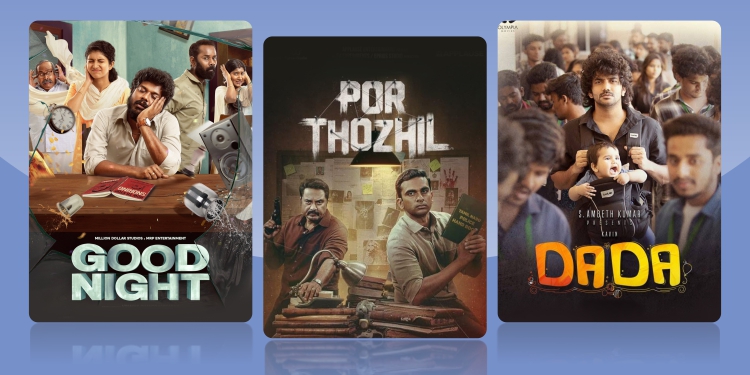The lineage of Tamil cinema is rife with strong story graphs. Never can one forget the strong plots of films directed by directors Bheem Singh, Sridhar, Balachander etc. The cost and the budget of those films were not even talked about then. The protagonists, even if they were women, were lauded on par with male heroes in commercial movies. Shadowing such a glorious past for the past one week, viral videos and comments have flooded social media criticising actor Vishal’s statement pooh-poohing small-budget films. Vishal’s statement was indeed shocking for most of us in the industry.
Is it not really demeaning the producers of small-budget films? Won’t it be discouraging producers from making films in the Rs.4 to 5 crore range and even lesser than that? As an actor of high standing and a responsible figure in the Actors Union, should he not have given much support for good low budget films? The real argument should always focus on good films and bad ones. The aesthetics and depth of a movie are not determined by just the budget of the film. It’s in the making. The budget, of course, supplements the process. Low budgeted films have had an impeccable impact.
Filmmaking is a passion, and the size, whether big or small, should not matter. Let’s not hence judge films by their scale, but rather by their outcome. Small can not only be beautiful but also bountiful. Ideally, Vishal should have urged caution against investing in the wrong films and expressed concern about the growing trend of movies promoting violence, crime, and sexual content.
Small Does Deliver
Small films can tap into new markets and catalyse growth in the creative economy. Vishal’s statement is akin to telling car users to opt only for Jaguars or Mercedes Benz, disregarding and degrading small cars .
If we delve into the numbers from the South Indian film ecosystem, this year, only about 2 pc of big-budget films have turned into blockbusters, while approximately 5 pc of small-budget films have achieved the same feat. Many small-budget films are helmed by debutante directors, infusing fresh talent into the industry. There are numerous instances of big-budget films failing to recoup their costs, putting immense pressure on producers to complete and release them.
A prime example is the recent comparison between “King of Kotha” and “RDX” in terms of profitability. RDX, with just 20 pc of King of Kotha’s budget and directed by a debutante, proved to be significantly more profitable. Recently, I spoke with the director of a small-budget film, whose previous project, made for Rs.6 crore, generated a Rs.10 crore profit and was completed in just four months.
Similarly, Sudani From Nigeria, made at a cost of Rs.80 to 90 lakh, became a massive blockbuster. In what other business can one expect such margins? Had we not believed in the potential of small-budget films, we might have missed gems like ‘Mandela’ which is said to have outperformed many big-budget films released along with it in terms of streaming platform viewership.
This year’s box office collections from films like ‘Por Thozil’, ‘Dada’, ‘Good Night’ and ‘Romancham’ stand as shining examples of small, content-driven films making significant contributions to the creative economy. The challenge for investors in small-budget films lies in identifying the right subject and assembling the right team for execution. In contrast, big-budget films often suffer from tales of directors going overboard and unreasonable demands from talent. Recently, there were rumours of an actor tripling his fees after the success of one film, making it infeasible for any producer to undertake quality projects.
Issues to Address
The uncertainties surrounding big-budget films are further exacerbated by the illogical practices of streaming platforms. Streaming platforms directly engage with actors, who then select their preferred director and team. This business model is fast becoming a bottleneck. Another concerning trend is the prioritisation of finding the right director-actor pairing over the importance of the story. Talent fees should be tied to a film’s theatrical performance, and it would be beneficial for actors to be compensated directly by streaming platforms, while the remaining production expenses could be recovered through theatrical releases and other exposures.
There are many small budget films worldwide ,done on shoestring budgets, that have become memorable blockbusters. All those films have managed to find perfect harmony between an interesting storytelling narrative and budget, thus raking the moolah for producers. Korean small-budget films have also garnered worldwide acceptance and so have content-driven small films from South India. Worldwide, people look up to the Malayalam film industry today for its experimentation and novelty. This is the new emerging trend, and our friend Vishal seems to have forgotten that.
It has been nearly two years since my transition from television to feature films, and my heart goes out to the creative talents seeking their first break. They tirelessly search for investors and opportunities, facing endless struggles. Unfortunately, there is no organised structure in this industry to nurture and mentor ideas from first-time filmmakers. Their ideas are sometimes stolen, and the lack of consistent income leads to depression and hardships. While big studios and talent often pay lip service to offering a helping hand, more concrete efforts, like talent hunt shows that identify promising directors, are urgently needed.
Some of the established stars do not even listen to the stories fully. I have seen much sought-out actors giving higher priority to the budget rather than to their roles and the story. In the case of stories which lack male machoism but where the heroine’s character would drive much more weight, they abnegate from even proceeding to listen. The matter of contention is more pronounced when the director is a first timer. There is a prejudiced, premeditated pooh-poohing of a first-time director – never to trust their talent. I would love to remind all great actors that they were first timers once . I would even suggest that a few producers clubb together or even individually produce small-budget films with first timers (directors / artistes / technicians) . Only then will a new perspective open, and a new aroma deluge.
In sum, the film industry should recognise the potential and value of small-budget films, offering support and opportunities to emerging talent, while also addressing the challenges and uncertainties that plague the production of big-budget films. Only then can we foster a more inclusive and thriving creative artistic ecosystem.
Vishal, of all the stakeholders, should have known this best. Unions should promote small, budgeted films and even the government should support them through novel schemes.
(The author is COO – Regional Content, IN 10 Media Network. Views expressed are Personal )

















